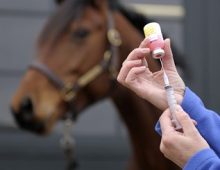Category Archives: Horses
Large Animal Care Facility
Our recent remodel included the addition of an adjacent large animal/equine care facility! Inside, there is a large area for our staff and vets to prepare for a variety of treatments, and two roomy box stalls. The stalls are set up to perform equine dentistry, wound care and surgery, as well as to house large animal patients that may need daily care. While Dr. Meyer has been offering large animal care, and even many surgical options, for years on the farm, this new facility will expand the care we are able to provide. Dentistry and surgery will now be available through the cold winter months. We are also able to offer more advanced surgical options year-round, such as hernia repair and cryptorchid geldings, utilizing both our new facility and our certified technicians for anesthetic monitoring. We are excited to continue serving our large animal clients’ needs, conveniently close to home!
Rabies is Incurable?!?
Rabies is a zoonotic disease, meaning it can be transmitted between people and animals. Wildlife like bats, skunks, and raccoons are some of the most common carriers of the disease. Infection occurs when saliva of the infected animal enters the bloodstream of another mammal (this is often from a bite). The disease can take weeks to months to develop symptoms, but once they develop the disease is fatal. Recent confirmed cases of rabies in bats in Ashland and Bayfield Counties have been documented. Please consider the following steps to protect yourself from this deadly disease:
•Keep your pets current on their rabies vaccination. It is only legally required in dogs, but highly recommend in other species (cats, horses, etc.). Not only will this protect your pet from rabies, but in turn it protects you from being exposed to rabies from your own pet.
•Keep your distance from mammalian wildlife, especially any exhibiting abnormal or sickly behavior (ex. a skunk roaming during daylight, a bat acting weak and sick)
•If you are bit by mammalian wildlife contact your local health department. They will direct you on how to submit the animal for rabies testing, if necessary. Only collect the animal if it can be done safely, and try to avoid damaging the head. If you cannot collect the animal, you should still contact your local health department for further instructions.
•If you find a bat in your house contact your local health department. Bat bites can often go unnoticed while you are sleeping. The health department will direct you on how to submit the animal for rabies testing, if necessary. Dr. Sarah Myers, Willow Animal Hospital
(photo courtesy of: www.delavanlakesvet.com)
TICKS: Beyond Lyme Disease & "Ewww!"
If you have lived in northern Wisconsin long enough you probably have run into a tick or two, or hundreds. You may be familiar with the most common risk with ticks as carriers of Lyme disease. Here are some things you may not know about tick diseases:
•The ticks in our area can carry many diseases that can effect both people and pets (Lyme, Anaplasmosis, Ehrlichiosis, and Rocky Mountain Spotted Fever are some of the most common)
•Of the many tick diseases, only Lyme disease has an available vaccine for dogs
•No vaccine (including the Lyme vaccine) is 100% effective at preventing diseases
•A multimodal approach to tick disease prevention is considered the most effective at keeping your pets safe (Lyme vaccine, topical or oral tick prevention products, daily tick checking, avoiding wooded or long grass areas during peak tick season)
•It can sometimes take several months after a tick bite for disease symptoms to develop
•Symptoms of tick diseases can include lethargy, anorexia, lameness, swollen painful joints, high fever
•The classic “bullseye” appearance of a tick bite that is described in people with Lyme disease is not typically seen in dogs
•Many tick disease infections carry a good prognosis if treated promptly and with the entire course of prescribed antibiotics
•Some tick disease infections can cause very serious side effects that may be fatal (ex. Lyme disease in some dogs can lead to a potentially fatal kidney failure)
Call us if you have other questions about tick diseases! Dr. Sarah Myers, Willow Animal Hospital
(photo courtesy of: www.pvguide.org)
Click HERE for 5 ways to protect your pet from Lyme disease.
Click HERE to learn more about protecting yourself & your family from Lyme disease.
Protect Your Horse With Vaccinations
Every spring questions arise regarding equine vaccination. What does my horse need? When should it be given? And others. Let me share some thoughts that may help you vaccinate your horse appropriately:
Many horses carry the Tetanus organism in their intestinal tract where it does no harm. However, their manure then serves as a source of this bacteria, which is dangerous if it enters the body through a wound. Thus, horses are especially prone to exposure to tetanus and all should receive an annual Tetanus toxoid vaccine. It makes no difference if your horse has exposure to other horses.
In like manner, there is a group of three diseases that are carried by birds and then spread from the bird to your horse via mosquitoes. Your horse can be infected by these agents even if it is totally isolated, simply because there are birds and mosquitoes everywhere.
These three agents/viruses are:
1) Eastern Encephalomyelitis (“Sleeping Sickness”)
2) Western Encephalomyelitis
3) West Nile
I recommend that all horses be vaccinated for these three agents, as well as Tetanus.
All the other vaccines out there are not quite so simple and require some decision-making. One question that I ask is, “Will your horse be exposed to other horses?” If you plan to travel to the fair, horse shows, etc. you should protect your horse against the diseases that spread from horse to horse. These include Rhinopneumonitis and Influenza. Immunity to these agents may not be long-lasting, so plan to vaccinate a month before exposure and/or consider a mid-season booster if your show season is long. Young horses (less than 6 years old) are also susceptible to “Strangles” (Streptococcus Equi). Rabies vaccine is also given to a very small percentage of horses in this area, despite our very low risk.
Beyond that, there are a number of other vaccines available (i.e. Equine Arteritis, Anthrax, Botulism, and Potomac Horse Fever) that are not routine at all for local horses, but may be helpful in special situations involving travel.
Dr. Steve Meyer, Willow Animal Hospital (photo courtesy of: www.thehorse.com
Merry Christmas!!!
Merry Christmas, from the doctors and staff at Willow Animal Hospital
Thank you for your business and friendship! May you feel God’s blessing during this holiday season, and have a new year that is full of hope and joy. (photo courtesy of: www.pinterest.com)
Proper Vaccinations are Key to Equine Health
Whether you and your horse stay home, hit the trails, or travel to competitions, proper vaccinations are key to equine health. We offer options and make a customized vaccination plan to suit your horse’s age and lifestyle.
Photo: horsenation.com












